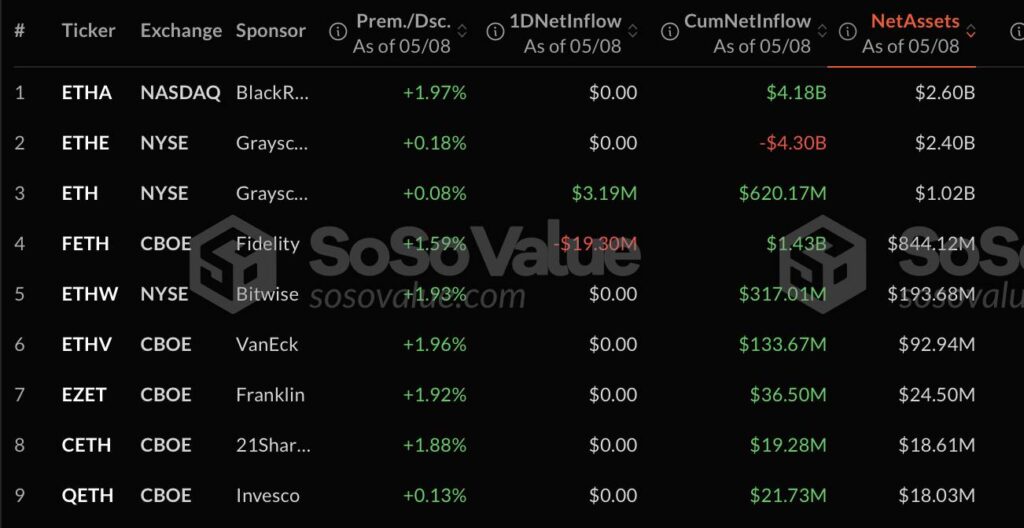In a significant move for the cryptocurrency industry, Wall Street powerhouse BlackRock has engaged in discussions with the Securities and Exchange Commission’s (SEC) Crypto Task Force, focusing on two revolutionary topics: staking within crypto exchange-traded products (ETPs) and the tokenization of securities. This meeting could potentially bolster institutional interest in cryptocurrencies, opening the doors for broader adoption and innovative financial products.
According to a memo from the task force dated May 9, BlackRock expressed its desire to explore the treatment of staking, particularly concerning ETPs that incorporate staking capabilities. As the leading provider of Ether (ETH) exchange-traded funds, BlackRock has highlighted that while these funds have seen considerable success, their functionality could be greatly enhanced with staking options—something fellow crypto ETF issuers seem to echo. For instance, earlier this year, the New York Stock Exchange proposed a rule change that would enable staking services specifically for Grayscale’s spot Ether ETFs, although the SEC’s decision on this change is still pending.
Staking, integral to many blockchain platforms that utilize proof-of-stake mechanisms, allows users to lock up their coins to earn rewards, heightening the appeal of ETPs linked to cryptocurrencies. The potential approval of staking for Ether ETFs may pave the way for similar requests concerning other altcoins, like Solana (SOL), thereby expanding the array of crypto investment options available to institutional players.
“Tokenization of securities under federal regulations was also on the agenda during the discussions, showcasing BlackRock’s commitment to innovating traditional finance.”
In addition to staking, BlackRock is actively investigating the tokenization of securities, a concept that aims to modernize how traditional financial instruments, such as stocks and bonds, are handled. This innovative approach promises advantages like faster settlement times, reduced costs compared to conventional financial systems, and the ability for markets to operate 24/7. Currently, BlackRock manages a US federal debt tokenized fund named BUIDL, boasting a market cap of $2.9 billion, making it the largest of its kind. Competing initiatives, such as Franklin Templeton’s BENJI fund, are also making strides in this space.
Not to be left behind, brokerage firm Robinhood is reportedly examining opportunities for securities tokenization, focusing on developing a blockchain that empowers retail investors in Europe to trade US stocks seamlessly. With the cryptocurrency landscape in constant evolution, these discussions could significantly impact the broader integration of digital assets into mainstream finance.
BlackRock’s Impact on the Future of Crypto and Tokenization
The recent discussion between BlackRock and the SEC could have significant implications for both institutional investment in cryptocurrency and the evolution of traditional financial instruments into digital assets.
- BlackRock’s Engagement with the SEC:
- Meeting focused on staking within crypto ETPs and the tokenization of securities.
- Potential to increase institutional interest in the crypto industry.
- Staking in Crypto ETPs:
- BlackRock aims to discuss treatment of staking for Ether ETFs, which could enhance their profitability.
- A potential SEC approval could lead to a domino effect prompting requests for staking capabilities in altcoin ETFs.
- Tokenization of Securities:
- Discussions on tokenizing traditional financial instruments, providing benefits such as faster settlement and lower costs.
- BlackRock’s BUIDL fund, a tokenized federal debt fund, has a market cap of $2.9 billion.
- Impact on Financial Markets:
- Tokenization could create 24-hour markets, enhancing trading flexibility and accessibility.
- Brokerages like Robinhood are working on blockchain solutions to enable retail investors to trade U.S. securities.
This development signifies a substantial shift towards integrating cryptocurrency within mainstream finance, potentially impacting how individuals and institutions approach investments.
BlackRock’s Strategic Moves in Crypto Staking and Tokenization
The recent meeting between BlackRock and the SEC’s Crypto Task Force marks a significant step in the ongoing evolution of the cryptocurrency landscape, particularly concerning crypto exchange-traded products (ETPs) and staking capabilities. This initiative positions BlackRock at the forefront of institutional interest, poised to capitalize on the burgeoning market for crypto ETPs. By advocating for enhanced staking services, BlackRock is not only addressing a notable gap in the current ETP offerings but also positioning itself as a leader in a space where competition is intensifying.
Competitive Advantages: BlackRock’s established reputation and extensive resources give it a substantial edge over other stakeholders in the crypto sector. The company’s proactive engagement with the SEC lays the groundwork for favorable regulatory outcomes, which could enhance investor confidence. Furthermore, by pushing for staking within Ether ETFs, BlackRock aligns itself with emerging trends around proof-of-stake mechanisms widely used in various blockchains. This could not only elevate its current Ether ETFs but also pave the way for new products that cater to altcoins like Solana (SOL), diversifying its offering and potentially increasing market share.
Moreover, BlackRock’s experience with tokenization sets it apart. Its existing BUIDL fund for US federal debt showcases its capability in this niche. As the company explores the tokenization of securities under U.S. regulations, it stands to revolutionize traditional finance. The benefits of tokenization—such as accelerated settlement times and lower transaction costs—are appealing to a financial sector increasingly looking for efficiency.
Disadvantages and Potential Issues: However, BlackRock’s endeavors aren’t without challenges. The SEC’s history of delaying decisions regarding staking and ETP product approvals casts a shadow on the realization of BlackRock’s ambitions. The crypto market is highly volatile, and regulatory changes can shift quickly, posing risks to BlackRock’s strategic plans. Competing entities, like Franklin Templeton and Robinhood, are also advancing in tokenization, which could dilute BlackRock’s market influence if those companies successfully roll out competitive products at a rapid pace.
This environment presents both opportunities and hurdles for retail and institutional investors. If the SEC grants approval for staking in Ether ETFs, it could catalyze a wider acceptance of cryptos among large financial institutions, thus amplifying investment opportunities. However, the complexity and ongoing regulatory scrutiny could deter less experienced investors, creating potential barriers for those looking to enter the market without adequate knowledge or risk management strategies.
In summary, BlackRock’s recent discussions around staking and tokenization illustrate its commitment to driving innovation within the crypto space. Yet, the company’s path is fraught with regulatory scrutiny and competition. Understanding these dynamics will be crucial for anyone engaging with or investing in the evolving world of cryptocurrency and tokenized assets.















